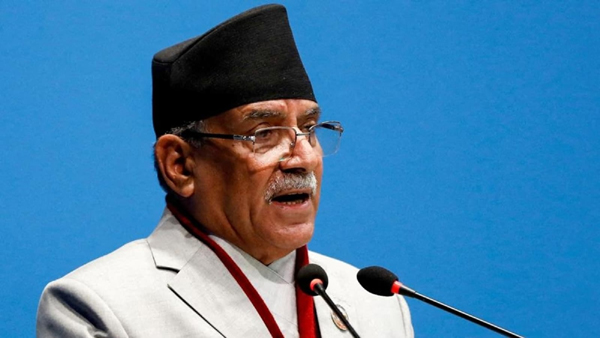KATHMANDU, Mar 19:
Nepal’s new five-party coalition government Tuesday said it will adhere to an independent foreign policy to safeguard its interests while adopting efficient policies on land management, forestry, climate adaptation and disaster management.
The coalition’s common minimum programme was unveiled at the Office of the Prime Minister and Council of Ministers in Singha Durbar, in the presence of Prime Minister Pushpa Kamal Dahal ‘Prachanda’ and the top leaders of the parties in the ruling alliance.
The document underscores the government’s focus on prioritising sovereignty and territorial integrity and fostering robust and balanced international relations. It has also underscored the need for “maintaining balanced, trustworthy and friendly relations with all the friendly countries, including the two neighbours (India and China), keeping sovereign equality, mutual interest and respect at the centre point.”
Emphasis on women’s participation, women’s empowerment, social inclusion, transitional justice, sustainable peace along with youth issues, sports, tourism, culture and social harmony are also part of the Minimum Common Policy Priorities and Resolve, which is considered a guideline for the functioning of the coalition government.
The preamble of the document states that the coalition government is committed to instilling hope and confidence among the people by tackling prevalent issues such as economic downturn and impunity.
It was read out by the CPN-UML vice chair and coordinator of the government’s Minimum Common Programme Draft Committee, Bishnu Prasad Paudel.
Prachanda, of the CPN (Maoist Centre), dumped the Nepali Congress and forged a new alliance with the Communist Party of Nepal (Unified Marxist-Leninist – CPN-UML) – the second-biggest party – led by former premier KP Sharma Oli on March 4.
On March 6, Prachanda appointed four ministers from his party, seven from the CPN-UML, three from the Rashtriya Swatantra Party (RSP) and two from the CPN (Unified Socialist), prompting the five-party coalition to work out new guidelines for governance. The fifth party in the coalition is the Janata Samajwadi Party (JSP).
The top five leaders including Prime Minister Prachanda, UML chair K P Sharma Oli, chair of CPN-Unified Socialist Madhav Kumar Nepal, RSP president Rabi Lamichhane and chair of JSP Upendra Yadav put their signatures on the document.
Nepal has struggled to maintain political stability in recent years. Prime Minister Prachanda has sought a vote of confidence in Parliament thrice since coming to power in December 2022. Nepal has witnessed 13 governments in the last 16 years.
The common minimum policy and priorities document includes a commitment to ensuring the integrity of financial institutions, enhancing public infrastructure, fostering good governance alongside efficient service delivery, promoting employment, entrepreneurship and domestic production and coordinating the development of physical infrastructure.
It also includes programmes to activate the share market through policy reforms, mobilise climate financing, implement the 16th periodic plan by carrying out an objective assessment of the 15th periodic plan, free the financial institutions of anomalies and resolve the problems of the cooperatives and microfinance.
“The document places the supreme interests of the Nepali people at the centre to instil hope and faith by tearing apart the sense of despondency among the people,” according to official sources.
The document stresses the urgency to complete the remaining tasks of the peace process. Additionally, it commits to providing treatment, employment opportunities and rehabilitation for individuals who were affected and disabled during the conflict period.
Furthermore, it highlights the necessity of fulfilling the tasks of compensation, rehabilitation, and reintegration for families impacted by the conflict. (PTI )


